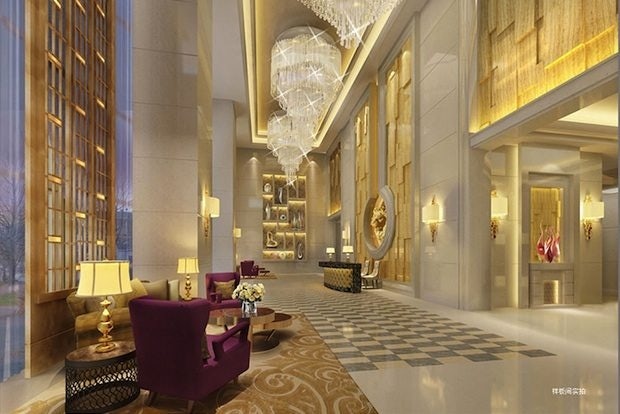
A rendering of the lobby of Fairmont's recently announced mixed-use residence and hotel project in Chengdu. (Fairmont)
Despite fears of a China real estate bubble, luxury developers are still rushing full-speed ahead into China’s second-tier cities to create high-end housing for wealthy buyers. On the front lines of this trend is Chengdu, which has seen several major global luxury companies choosing the Southwestern China city for their foray into the residential real estate market.
Yesterday, luxury hospitality company Fairmont Hotels & Resorts announced the development of a 36-story mixed-use residence project within the Palm Springs International Centre in Chengdu’s central business district, Tianfu New Town. Featuring both a luxury hotel and 382 two- and three-bedroom luxury apartments, the site will also contain a 42,100 square-meter luxury-shopping complex. According to a press release, the Fairmont Chengdu Residences will be Chengdu’s first branded residential offering.
While Fairmont has been expanding its hotel brand across China, Chengdu marks the company’s initial move into residential real estate.
Fairmont isn’t the only global luxury brand to see Chengdu as an entry point to the mainland’s high-end housing market. Armani Group announced in December 2013 that it is getting its China start in Chengdu with a 65-story project named “Art Residence”. The company's Armani/Casa Interior Design Studio is teaming up with Chinese company Mind Group to design two buildings complete with heated rooftop swimming pools and apartments fully furnished by Armani.

An Armani-designed residence in Istanbul. (Armani)
In September 2012, the Singapore-listed hospitality company Banyan Tree announced that it would open its first China residential project in Chengdu as well, revealing plans for a 333,350 square-meter site in the city’s suburbs. These projects will be joining hospitality company Ascott’s residence complex, the Ascot Raffles City Chengdu, which houses offices, luxury apartments, and a shopping mall.
Sichuan is currently one of China’s fastest-growing provinces, and Chengdu’s rapid economic growth makes it a prime location for luxury companies to enter the residential market with a more affordable investment. Banyan Tree founder Ho Kwon Ping told South China Morning Post that Chengdu was a good choice over second-tier cities because "prices in Shanghai and Beijing are over the top,” meaning “potential is limited." In addition, Chengdu’s growing status as a vacation spot means that brands can target wealthy Chinese buyers looking for both primary and holiday homes. As a result of these trends, luxury retailers have also been flooding into the city at a rapid pace.
These projects continue unabated in the face of fears of a major China housing bubble burst. A massive amount of speculative buying has caused one expert to assess that about 42 percent of housing demand comes from buyers who already own at least one home, and 65 percent of China’s household wealth is in real estate. As a result, housing costs have been surging while new units are being built far faster than residents can fill them. “At some point, China's property bubble will explode,” says a Bloomberg op-ed from January this year. “But for now, expect the government to pull out all the stops and borrow as much as needed to prop up housing values and, by extension, the nation's GDP bubble.” Meanwhile, other experts expect China’s housing market growth to slow, but not collapse.